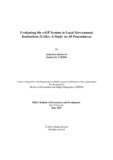| dc.contributor.author | Hossain, Jobaida | |
| dc.date.accessioned | 2022-01-23T05:20:56Z | |
| dc.date.available | 2022-01-23T05:20:56Z | |
| dc.date.copyright | 2019 | |
| dc.date.issued | 2019-06 | |
| dc.identifier.other | ID 17382011 | |
| dc.identifier.uri | http://hdl.handle.net/10361/15966 | |
| dc.description | This dissertation is submitted in partial fulfillment of the requirements for the degree of Masters in Procurement and Supply Management, 2019. | en_US |
| dc.description | Cataloged from PDF version of dissertation. | |
| dc.description | Includes bibliographical references (pages 39-40). | |
| dc.description.abstract | In developing economies like Bangladesh, Public sector led development is a highly responsible function linked to the requirement of spending public funds ensuring highest level of transparency, accountability, least cost, and quality standard. One major study of the World Bank/United Nations Development Program found that among too many reasons of aid utilization, one single main reason is procurement delay. According to a World Bank Study, procurement delays emanate from among others lack of necessary skills on the backdrop of absence of simplified procurement systems for procuring agencies. The management of public procurement with the help of information technology can help in this regard. The electronic Government Procurement promotes competition through participation of local as well as region bidders and government procurements are processed in more efficient, transparent and accountable manner. Grounded on these benefits, e-GP was introduced in the Local Government Engineering Department (LGED) in 2010-11 under the auspices of the Second Public Procurement Reform Project (PPRP II). After Successfully Implementing e-GP system in Target Agencies, Digitizing Implementation Monitoring and Public Procurement Project is Started, Its one major component aims to enhance the scope of e-GP for all public sector organizations across the country. Collectively all LGIs procure a lot using public fund. For enhancing digitization of public procurement, it is necessary to introduce e-GP within these institutions/organizations. The overall purpose of this study is to assess the implementation of e-GP in selected Local Government Institution i.e. some selected Pourashava offices. Identify the challenges of implementing e-GP in various stages of procurement cycle in Pourashava and find out the measures to overcome those challenges. A questionnaire survey has been administered among the officials of these offices. Survey data have been presented using statistical tools and with descriptions. Prior to presentation of anecdotal evidence from survey, the secondary information has been summarized which were collected from various documents and statistics published by World Bank, CPTU and other organizations. This study evaluates implementing e-GP in Pourashavas, challenge addressed and scope of further improvement. Finally, there is a lot of scope for further study and improvement in government procurement process. | en_US |
| dc.description.statementofresponsibility | Jobaida Hossain | |
| dc.format.extent | 42 pages | |
| dc.language.iso | en | en_US |
| dc.publisher | Brac University | en_US |
| dc.rights | Brac University dissertations are protected by copyright. They may be viewed from this source for any purpose, but reproduction or distribution in any format is prohibited without written permission. | |
| dc.subject | e-GP | en_US |
| dc.subject | Pourashava | en_US |
| dc.subject | Public procurement | en_US |
| dc.subject | Local government | en_US |
| dc.subject.lcsh | Government purchasing | |
| dc.subject.lcsh | Local government -- Bangladesh. | |
| dc.title | Evaluating the e-GP system in Local Government Institutions (LGIs): a study on 30 Pourashavas | en_US |
| dc.type | Dissertation | en_US |
| dc.contributor.department | Brac Institute of Governance and Development, Brac University | |
| dc.description.degree | M. Procurement and Supply Management | |

